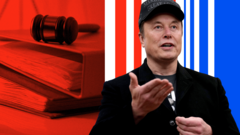Elon Musk, the world's richest man, has recently assumed a prominent role in an initiative aimed at significantly reducing U.S. government jobs and expenditures, leading to various legal and societal debates. Named the Department of Government Efficiency (Doge), this advisory body was established through an executive order from former President Donald Trump, reportedly tasked with identifying wasteful spending and improving government efficiency.
Musk's philosophy emphasizes eliminating what he perceives as bureaucratic inefficiencies and spending cuts that would translate into significant savings for taxpayers. He initially claimed that the initiative could save as much as $2 trillion per year, but later moderated his expectations. Recent polling indicates that cutting government spending is a popular idea among Americans, particularly among Republican voters, though opinions vary regarding Musk's personal influence over the process.
Despite its ambitious goals, Doge has faced criticism and legal challenges. Opponents, including government watchdogs and political rivals, argue that the group's operations lack transparency and threaten legal boundaries set by Congress. They highlight Musk's financial ties to government contracts as a potential conflict of interest.
Musk's team at Doge, composed mainly of young professionals with technology backgrounds, aims to implement reforms across several federal agencies, targeting initiatives deemed wasteful. Since its inception, it has reported savings attributed to curtailing diversity and inclusion contracts and has set out to overhaul agencies like USAID and the Consumer Financial Protection Bureau (CFPB), which they label as inefficient.
Critics contend that Musk's drive to streamline government functions is an ideological mission targeting agencies that do not align with his and Trump's political views, raising concerns about the equitable application of such cuts. Furthermore, several lawsuits have emerged, placing significant constraints on Doge’s activities, including court interventions blocking certain measures aimed at accessing sensitive government data.
Musk insists that the American public has called for reform and that there is a collective will for common-sense changes within the government, though many experts doubt the feasibility of his aggressive budgetary targets. Historical precedence shows that while reductions in government spending are attainable, the vision of slashing a third of the federal workforce may be unrealistic, given the intricate nature of mandatory spending programs that benefit millions.
As the debate continues, Doge and its controversial leadership remain focal points in discussions surrounding the future of government efficiency in the United States, illustrating the intersection of influence, politics, and public opinion in contemporary governance.




















